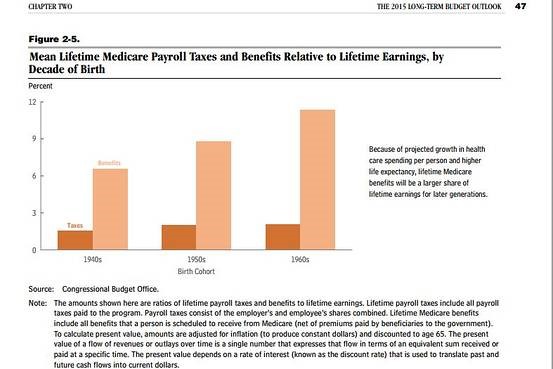Debt Deniers: How the Corporate Media Attacks Conservatives over Entitlement Reform
Want to understand why our nation faces a $31 trillion national debt and few politicians willing to do something about it? A recent Politico story provides a helpful guide.
While the press and the left (but I repeat myself) view catastrophic climate change as a certainty — a prism that makes leftists’ big-government solutions to the “climate crisis” plausible — it takes a far more skeptical tone toward conservative proposals for entitlement reform. In this vein, Natalie Allison’s story about conservatives supporting the “privatization” of Social Security and Medicare uses several tactics to marginalize lawmakers courageous enough to propose reforms that our country will need to remain solvent in future decades.
Conflating ‘Privatization’ with Any Reforms
The article uses the word “privatization” or some derivation thereof 21 times, while referencing the word “reform” but once. At no point does Allison ever define or describe, even in general terms, what she means when using the word “privatization,” or what the politicians who used it referred to.
I would like to know exactly what specific proposal, or proposals, Allison references to debate these ideas on their merits or lack thereof. By failing to provide any details, Allison effectively uses “privatization” as a general slur, to encompass any proposal for substantive changes to Medicare or Social Security.
The fact that Allison also uses the word “cuts” provides some indication as to her intent. Leftist politicians use the word “cut” to describe any reduction in the growth of future spending — for instance, a hypothetical proposal that would reduce Medicare spending growth to 5 percent per year, instead of 7 percent. The fact that the article embraces these tropes, presupposing that government has some predetermined right to grow exponentially in perpetuity, indicates a partisan bias.
Presenting Fact as Opinion
When talking about entitlement reform, Allison characterizes the reasons conservatives have proposed changes to Medicare and Social Security from a highly detached perspective: “Privatizing government entitlement programs has long been a policy goal for some segments of the Republican Party who worry about the federal deficit and the growing share of the federal budget those programs take up.”
That detachment comes at a price of accuracy, for at no point in the article does Allison note that Medicare and Social Security face looming insolvency. In the case of Medicare, which is already functionally insolvent, the program’s official insolvency will come within half a dozen years. So say the Medicare trustees, all of them Democrats, in this year’s report. Allison presented a fact (i.e., entitlement insolvency) as an opinion held by “some segments of the Republican Party,” rather than an official projection made by the U.S. government and four officials appointed by President Biden and confirmed by a Democrat-controlled Senate.
As a further thought experiment, substitute “entitlement reform” with “climate change” and “Republicans” with “Democrats” in the above passage. Does anyone believe a Politico reporter would take such a skeptical tone if the roles were reversed? “Lowering carbon emissions has long been a policy goal for some segments of the Democratic Party, who worry about potential effects on the environment.”
The fact that the left wants to fire the president of the World Bank for stating that “I am not a scientist” regarding climate change answers the question. It seems highly unlikely that any Politico reporter would take such a skeptical tone toward climate change — and if they did, leftists would demand that reporter’s termination in a New York minute.
Ignoring Inconvenient Truths
The opening paragraph of Allison’s story claims that Republican proposals for entitlement reform have proven unpopular, “but for some reason, they keep trying.” The introduction, if not the entire story, implies that conservatives keep offering entitlement reform without any justification for doing so, other than an ideological axe to grind.
The introduction to the Medicare trustees report includes the following passage, which provides a simple answer to Allison’s question about why lawmakers continue to propose changes to entitlements. It’s because the programs require changes to remain afloat.
Current-law projections indicate that Medicare still faces a substantial financial shortfall that will need to be addressed with further legislation. Such legislation should be enacted sooner rather than later to minimize the impact on beneficiaries, providers, and taxpayers.
As noted above, these words were approved by the four trustees of the Medicare and Social Security programs, who were all appointed by President Biden. Yet not a word about the two programs’ looming insolvency appeared in the lengthy 27-paragraph story.
Allison took the time to include the number of New Hampshire senior citizens receiving Medicare and Social Security in her article. Could she not have done a simple Google search for “Medicare insolvency date,” or did she not want to?
We Need Reform, Not Debt Deniers
As to Allison’s skepticism of why conservatives would propose entitlement reforms, a Congressional Budget Office report from 2015 provides all the reason in the world. It shows that the average senior citizen receives far more in Medicare benefits than he paid in Medicare taxes.

This chart shows how desperately our entitlement programs need reform — because, by definition, it’s impossible to sustain giving everyone more in benefits than they paid in taxes.
Conservative lawmakers shouldn’t make themselves easy prey for reporters’ gotcha tactics by using words like “privatization,” whose loaded connotations provide an easy invitation for stories like Allison’s. But they should propose significant, substantive reforms to our nation’s entitlement programs — and reporters should stop denying the fiscal time bomb that our nation faces.
This post was originally published at The Federalist.